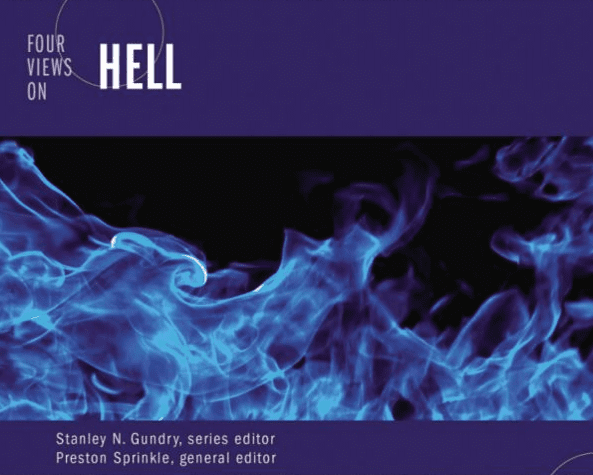Because of the firestorm created, I am beginning these discussions of Rob Bell’s book, Love Wins: A Book About Heaven, Hell, and the Fate of Every Person Who Ever Lived, with a prayer. I am asking that you pause quietly and slow down enough to pray this prayer as the way to approach this entire series:
O Lord, you have taught us that without love whatever we do is worth nothing:
Send your Holy Spirit and pour into my heart your greatest gift,
which is love, the true bond of peace and of all virtue,
without which whoever lives is accounted dead before you.
Grant this for the sake of your only Son Jesus Christ,
who lives and reigns with you and the Holy Spirit, one God,
now and for ever. Amen.†
 Hell. That’s the subject of conversation today. And God. Our view of God is implicit and explicit in our view of hell. The question then is what view of God is suggested by your view of hell? And, how does your view of God shape your view of hell? [Forgot: If you like this conversation, please FB share it or Retweet it…. thanks.]
Hell. That’s the subject of conversation today. And God. Our view of God is implicit and explicit in our view of hell. The question then is what view of God is suggested by your view of hell? And, how does your view of God shape your view of hell? [Forgot: If you like this conversation, please FB share it or Retweet it…. thanks.]
I want us to sit back for a moment to consider the single-most important problem Rob Bell is facing and seeking to resolve in this book. That problem for him is how many in the church, and by and large most in the 19th and 20th Century of American evangelicals, have understood hell and who and how many populate hell. And what that view implies about God. Here are the three big facts, and you correct me if I’m wrong here.
Those who have heard the gospel and who have accepted it will go to heaven.
Those who have heard the gospel and not accepted it will go to hell.
Those who have not heard the gospel will also go to hell.
I am aware that some, I don’t know how many, believe in a fourth line:
Those who have not heard the gospel may be in a special class, and could be judged in a different way — on the basis of the light they have received from natural revelation. [At the end of this post I briefly discuss other options.]
But my experience in the evangelical world, which historically has been more or less exclusivist (salvation only in Christ, but also understood as consciously responding in this life to the preaching of the gospel itself [again see end of this post]), does not lead me to believe that there’s much reason for hope for those who have not heard. And there’s no hope for those who have heard and who have not accepted the gospel. Yes, some are much more optimistic about the fate of those who have never heard the good news about Jesus Christ, but Rob is not responding to the optimistic evangelical.
But this sketch of three or four points isn’t all of Rob Bell’s problem.
If one takes that third fact seriously, and many evangelicals have done just that, it means that most — let’s say the vast majority — of humans will go to hell because most have not heard the gospel at all. And vast numbers who have have not accepted it. Witness contemporary Europe for instance, or much of Russia. Add now to this the millions and millions in the Far East, most of those in African until the missionary movement, those in Muslim countries and millions in South America and other places not mentioned on this good globe of ours… and then add to this those who a thousand years or ago in far off places … you get the picture. The problem that arises from these three (or four) facts is that God created millions and millions of human beings over time and only a select number of them will go to heaven. The problem that arises, therefore, entails what we believe about God.
Of course, there are some theologians and probably loads of Christians who have believed otherwise. But the fact is that if one believes salvation is only in Christ (exclusivism) and and that to be a believer one must consciously believe the gospel, then Rob Bell’s caricatures or exaggerations are not as far fetched as some might be suggesting. And the more one fudges in the direction of inclusivism — that there’s a wideness in God’s mercy, or that there’s a different judgment for those who have not heard (and it’s merciful etc etc), that those who died before they were born, or before the age of accountability, etc — the less one fits the stronger exclusivist category. It’s fair to ask “Why infants who die will be saved but not those who have never heard?” And it’s fair to ask “If infants can be saved, why not others?”
I don’t believe anyone should be after or for Rob Bell’s book until one has grappled with this problem. It won’t do just to poke at Rob’s soteriology, or lack of interest in how the atonement occurs … yes, those issues need examination. But the problem probed in this book, as I see it, and this is dawning on me the more I ponder it and the responses, is this:
I believe most evangelicals Christians, and I won’t speak for Catholics and Orthodox etc, suppress this problem to where it doesn’t really matter. Furthermore, they not only suppress that question but they suppress what it makes them think about God in quiet moments. So, there’s a fifth approach that many take today:
We don’t know what becomes of the millions, perhaps billions, who have never heard the gospel.
But, this appeal to agnosticism is for far too many a cop-out. It is too often born in a conviction that doesn’t have courage. Many of these are true-blue exclusivists but don’t like its implications, so they say “I don’t know” or “That’s in God’s hands.” [On other kinds of agnosticism, see below.] Some use agnosticism as a cloak for a universalism or pluralism they don’t want to admit.
So, I contend we have to get inside this problem and explore it through the problem itself and not explore it simply through our already confident soteriology or doctrine of Scripture. The problem is that no matter how strong your view of Scripture or salvation you have to come to terms with who and how many are in hell or who and how many will be saved. We might not know numbers, but our theology will inform us about the “who” and that will also mean the “how many” is also clarified.
I’ve asked a question like this — how many North Koreans will be in hell? — a number of times to friends in the last month and I’ve had very few say “All” or “Most” but instead there’s been a nice genteel “I don’t know.” But that “I don’t know” seems to me to fly in the face of the dogmatism against Rob’s much softer — almost all or all or he hopes all — view.
You can’t condemn Rob’s view until you face the problem and tell the world your quantification theory. The more you say “I don’t know” the more Martin Bashir is asking you what he asked Rob Bell.
[Some other options:
1. Double predestination, which is appealed to rarely and even more rarely claimed publicly in this sort of discussion, would say “For those who have not heard the gospel … if they were elect, they’ll be saved. If not they, they’ll not be saved.”
2. Other terms often used are inclusivism (that God saves through Christ but includes others on the basis of what work, and that inclusion is based on response to truth) and accessibilism (that God somehow reveals his saving truth to all humans who have ever lived, and has done so at least one time in the life of each person, and judges on that basis but salvation is only through Christ). I am ignoring post Vatican II Catholic thinking and Orthodox thinking because it does not appear to me Rob is speaking into those contexts.
3. Religious instrumentalism teaches that God uses other religions to point us toward God and, in some forms, that Christ is present in those other religions though in a lesser way than is present in the Christian faith.
4. It seems to me that many evangelicals, if not most, understand exclusivism through the lens of what Terry Tiessen calls “ecclesiocentrism“: salvation is coextensive with the church whose responsibility it is to proclaim the gospel. So, exclusivism here means through Christ but that “Christ” is known only through the gospel, which is made known by the church’s witness.
5. There are two other kinds agnosticism: some are optimistic, like John Stott and R. Mouw, and others are pessimistic, like J.I. Packer and D.A Carson. This sketch was helped along by T. Tiessen, Who Can Be Saved?: Reassessing Salvation in Christ and World Religions.]
For other posts, see Tony Jones, Greg Boyd.
Jeff Cook compares Rob Bell with C.S. Lewis.
Early Rob Bell reviews.















